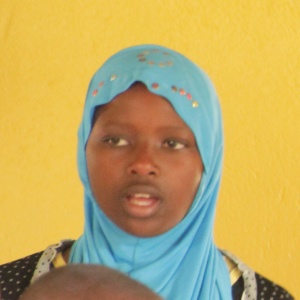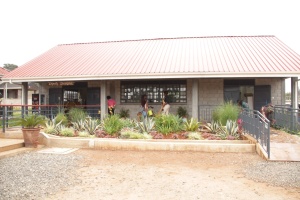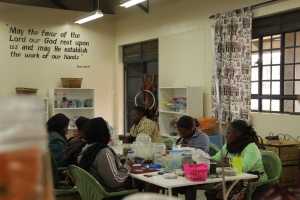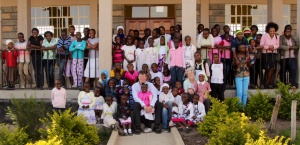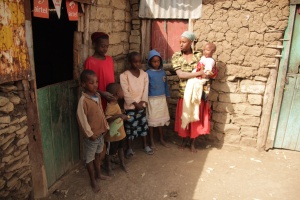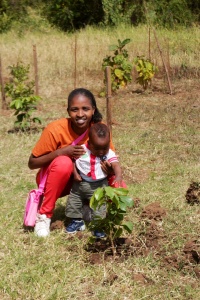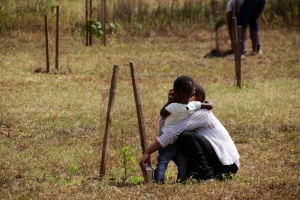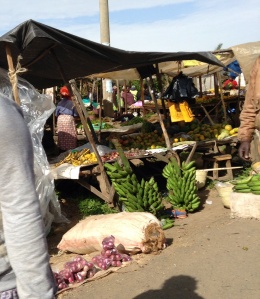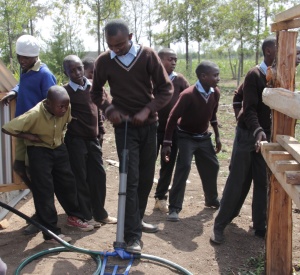
 In his hand is the life of every creature and the breath of every human life. (Job 12:10) These words follow a declaration by Job that even the animals know that God is the Creator and never lets go of them and us.
In his hand is the life of every creature and the breath of every human life. (Job 12:10) These words follow a declaration by Job that even the animals know that God is the Creator and never lets go of them and us.
These words settled on my heart as we left Ol Pejeta Wildlife Park on Tuesday. Like every day, I was reflecting on what one thing God might have for me in the day’s experience. This was the one day in our trip that we designated as our holiday. We were picked up at 6:00 a.m., before sunrise, by our guide, Peter. We rode about 20 minutes to the entrance to the park, and with the sun rising over Mt Kenya our safari began. For the next ten hours (with a stop for lunch), we rode through this 125,000 acre park looking for wild animals. It is always an amazing experience to ride in an open sided Land Cruiser, stopping within feet of animals that could easily put an end to our lives (a pride of 16 lions, for example, resting beneath a tree not more than a dozen yards in front of us). It became a message about God’s peaceable kingdom when neither human nor beast feels threatened.
I began reflecting on the greater message of good and evil from human hands. From God’s hand comes life and goodness, and when we fully reflect the image of God that’s what comes forth from us. But we humans have the ability to choose what is evil when we focus on what seems best for us. That message came to me in two stops, both pictured here.
Chimpanzees are not native to Kenya, but within the park a large chimpanzee rescue has been constructed to continue the work of Jane Goodall. Chimpanzees are an endangered species, their greatest threat is humans. Our guide told us that there are more chimpanzees in captivity around the world than in the wild. Their habitat has been destroyed for human use. Many have been taken as pets (which rarely ends well) and hunted as food. What God has created, humans have destroyed – intentionally and unintentionally. But now there is this effort (not without controversy since chimpanzees are not indigenous to Kenya) to care for chimps that have been mistreated and injured. Humans are caring for the wounded creatures by providing a haven of security. One of the frustrations for visitors is that it is difficult to see the chimpanzees – but then, the refuge is not for our benefit but the chimpanzees. There is a small viewing area in which is it only possible to see a chimpanzee if it happens to come close to the viewing area. We were fortunate to see three of them in our visit.
And then there was Baraka (the swahili word for blessing). He is a ten-year old black rhinoceros that is blind. This park has dozens of rhinos, and we were fortunate to see both white and black rhinos. The rhinoceros is endangered, because of poaching for its ivory horn. A fully grown rhinocerous weighs about 2 tons, and to cut off the horn, poachers kill the animal. There would be no poaching if there weren’t a market for ivory and a price worth taking the risk of poaching. But here was Baraka, one eye missing a result of a fight with another rhino and the other eye rendered blind as a result of disease – and yet his life preserved. The point of his horn cut to reduce the value for poachers, then placed in an area where he is guarded.
We are living and walking amid great contrasts. In many ways, we see how life has little value. We hear the reports of tribal violence (In the media, you hear it reported as Muslim terrorists – but it is more complicated than that. There are reasons why advance warnings of attacks go unheeded as one tribal group attacks another.) We see the harsh and frankly, inhumane living conditions all around us. Try living on two dollars a day for an entire family! The hopelessness devaluing all of life. And yet, we also see valiant efforts by persons within Kenya and persons outside this country giving resources to championing life and providing great effort to say even one life has value. Your giving allows you to proclaim the value of life and to stand here as a co-Creator with God.
In God’s hand is the life of every creature and the breath of every human life. Amen.
In his hand is the life of every creature and the breath of every human life. (Job 12:10) These words follow a declaration by Job that even the animals know that God is the Creator and never lets go of them and us.
These words settled on my heart as we left Ol Pejeta Wildlife Park on Tuesday. Like every day, I was reflecting on what one thing God might have for me in the day’s experience. This was the one day in our trip that we designated as our holiday. We were picked up at 6:00 a.m., before sunrise, by our guide, Peter. We rode about 20 minutes to the entrance to the park, and with the sun rising over Mt Kenya our safari began. For the next ten hours (with a stop for lunch), we rode through this 125,000 acre park looking for wild animals. It is always an amazing experience to ride in an open sided Land Cruiser, stopping within feet of animals that could easily put an end to our lives (a pride of 16 lions, for example, resting beneath a tree not more than a dozen yards in front of us). It became a message about God’s peaceable kingdom when neither human nor beast feels threatened.
I began reflecting on the greater message of good and evil from human hands. From God’s hand comes life and goodness, and when we fully reflect the image of God that’s what comes forth from us. But we humans have the ability to choose what is evil when we focus on what seems best for us. That message came to me in two stops, both pictured here.
Chimpanzees are not native to Kenya, but within the park a large chimpanzee rescue has been constructed to continue the work of Jane Goodall. Chimpanzees are an endangered species, their greatest threat is humans. Our guide told us that there are more chimpanzees in captivity around the world than in the wild. Their habitat has been destroyed for human use. Many have been taken as pets (which rarely ends well) and hunted as food. What God has created, humans have destroyed – intentionally and unintentionally. But now there is this effort (not without controversy since chimpanzees are not indigenous to Kenya) to care for chimps that have been mistreated and injured. Humans are caring for the wounded creatures by providing a haven of security. One of the frustrations for visitors is that it is difficult to see the chimpanzees – but then, the refuge is not for our benefit but the chimpanzees. There is a small viewing area in which is it only possible to see a chimpanzee if it happens to come close to the viewing area. We were fortunate to see three of them in our visit.
And then there was Baraka (the swahili word for blessing). He is a ten-year old black rhinoceros that is blind. This park has dozens of rhinos, and we were fortunate to see both white and black rhinos. The rhinoceros is endangered, because of poaching for its ivory horn. A fully grown rhinocerous weighs about 2 tons, and to cut off the horn, poachers kill the animal. There would be no poaching if there weren’t a market for ivory and a price worth taking the risk of poaching. But here was Baraka, one eye missing a result of a fight with another rhino and the other eye rendered blind as a result of disease – and yet his life preserved. The point of his horn cut to reduce the value for poachers, then placed in an area where he is guarded.
We are living and walking amid great contrasts. In many ways, we see how life has little value. We hear the reports of tribal violence (In the media, you hear it reported as Muslim terrorists – but it is more complicated than that. There are reasons why advance warnings of attacks go unheeded as one tribal group attacks another.) We see the harsh and frankly, inhumane living conditions all around us. Try living on two dollars a day for an entire family! The hopelessness devaluing all of life. And yet, we also see valiant efforts by persons within Kenya and persons outside this country giving resources to championing life and providing great effort to say even one life has value. Your giving allows you to proclaim the value of life and to stand here as a co-Creator with God.
In God’s hand is the life of every creature and the breath of every human life. Amen.
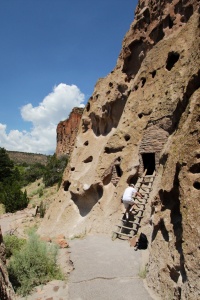 Last week, we (Amanda and me) spent a day hiking in Bandelier National Monument. We spent our day in one valley, and at one point hiked a mile to the top of the ridge. The ancestral Pueblo people arrived in this valley in the mid-13th century, building villages on the valley floor and also living in caves carved from the canyon walls. By the 15th century, the people moved on to other areas of what is now New Mexico. We spent our day exploring many of the caves, climbing the ladders to get inside their homes and see the petroglyphs painted on the walls.
Last week, we (Amanda and me) spent a day hiking in Bandelier National Monument. We spent our day in one valley, and at one point hiked a mile to the top of the ridge. The ancestral Pueblo people arrived in this valley in the mid-13th century, building villages on the valley floor and also living in caves carved from the canyon walls. By the 15th century, the people moved on to other areas of what is now New Mexico. We spent our day exploring many of the caves, climbing the ladders to get inside their homes and see the petroglyphs painted on the walls.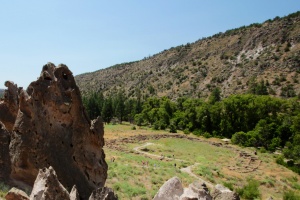 The ancestral Pueblo people left no written history, and yet archeologists have learned much about the way they lived, how they established community, and the values that were important to them – all this just by uncovering what they left behind.
The ancestral Pueblo people left no written history, and yet archeologists have learned much about the way they lived, how they established community, and the values that were important to them – all this just by uncovering what they left behind.
